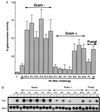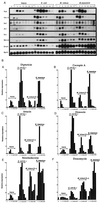Drosophila host defense: differential induction of antimicrobial peptide genes after infection by various classes of microorganisms
- PMID: 9405661
- PMCID: PMC25070
- DOI: 10.1073/pnas.94.26.14614
Drosophila host defense: differential induction of antimicrobial peptide genes after infection by various classes of microorganisms
Abstract
Insects respond to microbial infection by the rapid and transient expression of several genes encoding potent antimicrobial peptides. Herein we demonstrate that this antimicrobial response of Drosophila is not aspecific but can discriminate between various classes of microorganisms. We first observe that the genes encoding antibacterial and antifungal peptides are differentially expressed after injection of distinct microorganisms. More strikingly, Drosophila that are naturally infected by entomopathogenic fungi exhibit an adapted response by producing only peptides with antifungal activities. This response is mediated through the selective activation of the Toll pathway.
Figures



References
-
- Hultmark D. Trends Genet. 1993;9:178–183. - PubMed
-
- Hoffmann J A. Curr Opin Immunol. 1995;7:4–10. - PubMed
-
- Tryselius Y, Samakovlis C, Kimbrell D A, Hultmark D. Eur J Biochem. 1992;204:395–399. - PubMed
-
- Wicker C, Reichhart J M, Hoffmann D, Hultmark D, Samakovlis C, Hoffmann J A. J Biol Chem. 1990;265:22493–22498. - PubMed
Publication types
MeSH terms
Substances
LinkOut - more resources
Full Text Sources
Other Literature Sources
Molecular Biology Databases

